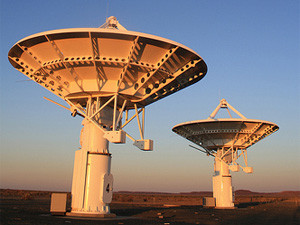
Scientists from Square Kilometre Array (SKA) SA will join IBM and the Netherlands Institute for Radio Astronomy (ASTRON) in a four-year collaboration to research new computing systems to deal with the big data challenge posed by the SKA.
SKA SA is a business unit of the South African National Research Foundation, which is now a user platform partner for the DOME project. DOME is a public-private partnership launched by IBM and ASTRON last year to investigate emerging technologies for large-scale and efficient exascale computing for the SKA.
IBM says the SKA presents an unprecedented big data challenge: "When the SKA is completed, it will collect Big Data from deep space containing information dating back to the Big Bang more than 13 billion years ago. The aperture arrays and dishes of the SKA will produce 10 times the global Internet traffic, but the power to process all of this data as it is collected far exceeds the capabilities of the current state-of-the-art technology."
In May last year, it was announced that a "dual site" decision had been made, which would see the 500 000 antennas of the SKA project (the world's largest radio telescope) scattered across both Southern Africa and Australia. Construction is expected to begin in 2017 and conclude in 2024.
"The project constitutes the ultimate Big Data challenge, and scientists must produce major advances in computing to deal with it. The impact of those advances will be felt far beyond the SKA project," says IBM.
Technical coordinator for DOME-SA, Simon Ratcliffe, says the collaboration brings together a "dream team" of scientists and engineers. "This project lays the foundation to help the scientific community solve other data challenges such as climate change, genetic information and personal medical data," says Ratcliffe.
Learn and reason
IBM's SVP of research, John Kelly, says: "I believe that SKA represents the ultimate big data challenge, and that the technology we develop for handling its data will provide a foundation for the next era of computing.
"The work we're doing for the SKA will enable computer scientists to develop cognitive computing systems that will help us penetrate the incredible complexity of data that is sensory, noisy and vast. Like Watson, it will learn and reason ? helping human experts to see the world more clearly and make better decisions. The SKA work truly is one of the first major forays into a new era of computing," says Kelly.
DOME project leader for IBM Research, Dr Ton Engbersen, says the DOME research will help provide the foundation for cognitive computing by providing technologies that learn and reason.
"Ultimately, these technologies will transform entire industries," says Engbersen. "For example, we are designing a system for storing information that learns from its interactions with the data and parcels it out in real-time to the storage medium that's most appropriate for each bit, which can also be applied to medical images."
The SKA SA scientists will specifically focus on signal processing and advanced computing algorithms for the capture and analysis of SKA data. They are also developing rugged or 'desert-proof' microservers which will be able to withstand extreme environmental conditions.
According to a statement, the 64 dishes of the MeerKat telescope will also be used for the testing and development of a new software program that "will aid in the design of the entire computing system holistically and optimally".
Share